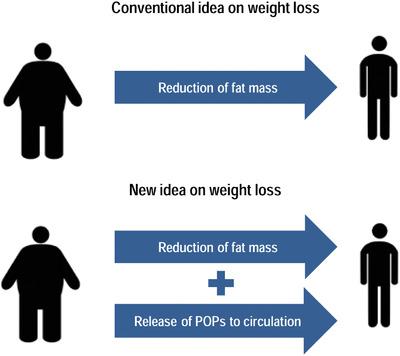Our official English website, www.x-mol.net, welcomes your feedback! (Note: you will need to create a separate account there.)
Lipophilic Environmental Chemical Mixtures Released During Weight-Loss: The Need to Consider Dynamics.
BioEssays ( IF 4 ) Pub Date : 2020-05-04 , DOI: 10.1002/bies.201900237 Duk-Hee Lee 1 , David R Jacobs 2 , Lars Lind 3 , P Monica Lind 4
BioEssays ( IF 4 ) Pub Date : 2020-05-04 , DOI: 10.1002/bies.201900237 Duk-Hee Lee 1 , David R Jacobs 2 , Lars Lind 3 , P Monica Lind 4
Affiliation

|
Intentional weight loss can increase health risk in the long-term, despite short-term benefits, because human adipose tissue is widely contaminated with various lipophilic environmental contaminants, especially persistent organic pollutants (POPs). Recently, chronic exposure to low POPs has emerged as a new risk factor for common metabolic diseases and cardiovascular diseases. The amount of POPs released from adipocytes to the circulation increases during weight loss, thereby increasing POPs exposure of other critical organs. Possible harmful effects due to release of POPs during weight loss are opposite to those usually expected from losing weight. It is speculated that this tradeoff can explain recent puzzling findings on intensive weight loss. The presence of POPs in adipose tissue adds a challenge to weight management and an optimal strategy of weight management needs to consider both fat mass and dynamics of POPs.
中文翻译:

减肥期间释放的亲脂性环境化学混合物:需要考虑动力学。
尽管有短期益处,但有意减肥从长远来看会增加健康风险,因为人体脂肪组织广泛受到各种亲脂性环境污染物的污染,尤其是持久性有机污染物 (POPs)。最近,低 POPs 的长期暴露已成为常见代谢疾病和心血管疾病的新危险因素。在减肥过程中,脂肪细胞向循环系统释放的持久性有机污染物数量增加,从而增加了其他关键器官的持久性有机污染物暴露。由于减肥期间持久性有机污染物的释放而可能产生的有害影响与通常预期的减肥相反。据推测,这种权衡可以解释最近关于密集减肥的令人费解的发现。
更新日期:2020-05-04
中文翻译:

减肥期间释放的亲脂性环境化学混合物:需要考虑动力学。
尽管有短期益处,但有意减肥从长远来看会增加健康风险,因为人体脂肪组织广泛受到各种亲脂性环境污染物的污染,尤其是持久性有机污染物 (POPs)。最近,低 POPs 的长期暴露已成为常见代谢疾病和心血管疾病的新危险因素。在减肥过程中,脂肪细胞向循环系统释放的持久性有机污染物数量增加,从而增加了其他关键器官的持久性有机污染物暴露。由于减肥期间持久性有机污染物的释放而可能产生的有害影响与通常预期的减肥相反。据推测,这种权衡可以解释最近关于密集减肥的令人费解的发现。


























 京公网安备 11010802027423号
京公网安备 11010802027423号